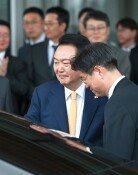[Opinion] Gwamegi
Gwamegi, the dried fish, is winter wellbeing food. Enjoy the delicious taste of Gwamegi with Korean traditional sauce wrapped in cabbage, lettuce, seaweed or tangle weed! Even the thought of eating the dish makes ones mouth water. The original Gwamegi was made of herrings, but when they became rare, mackerels began widely being used. However, their taste, nutritional value and efficacy are comparable to herrings. Gwamegi is good for facilitating child development, maintaining healthy skin, and preventing aging, and contains HDL cholesterol. Its also chosen for an accompaniment of alcohol as it is rich in aspartic acid that is effective in warding off hangovers.
Gwamegi, which has its origin in Pohang, North Gyeongsang Province, is traditional food in coastal areas of Guryongpo on Yeongil Bay. The name Gwamegi originated from a dialect. Megi meaning the eye of mackerel was combined with gwan referring to being pierced with a stick. Then, the word "Gwanmegi" came to be pronounced as "Gwamegi, as "n" sound was omitted. One can easily witness fish farmers who dry mackerels in Pohang. Seoulites began relishing its delicious taste from ten years ago, and now Americans are set to enjoy it.
Gwamegi producers have been in high spirits since Lee Myung-bak hailing from Pohang was elected president. The presidential transition committee served reporters with 300 servings of Pohang Gwamegi last weekend. Though the committee said they did to thank for their efforts, it clearly helped promote Gwamegi. It is reminiscent of the presidential transition committee of five years ago who treated reporters with dishes made with Heuksan Island thornback skates, a special dish in South Jeolla Province. The status of sea food is also changing with the change in power.
Sea food has closely been linked to power as port cities started producing presidents starting from former President Kim Young-sam. In his administration, prosecutors likened public officials to flounders and soles. Those from Daegu, North Gyeongsang Province, who have been in power for 30 years from the Park Chung-hee administration through the Roh Tae-woo administration were compared with flounders, and those from Busan, South Gyeongsang Province, with soles, which are deemed inferior to flounders. In administrations of Kim Dae-jung and Roh Moo-hyun, officials from Jeolla provinces wielded influence. Then, is an era of Gwamegi ushering in?
Editorial writer Yook Jeong-su, sooya@donga.com







